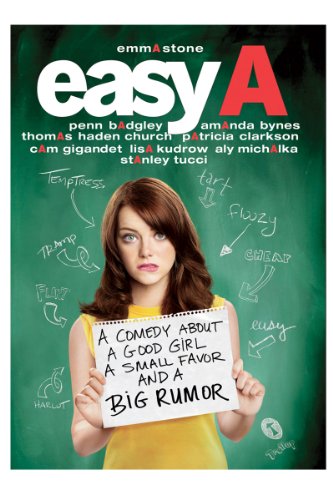All Nonfiction
- Bullying
- Books
- Academic
- Author Interviews
- Celebrity interviews
- College Articles
- College Essays
- Educator of the Year
- Heroes
- Interviews
- Memoir
- Personal Experience
- Sports
- Travel & Culture
All Opinions
- Bullying
- Current Events / Politics
- Discrimination
- Drugs / Alcohol / Smoking
- Entertainment / Celebrities
- Environment
- Love / Relationships
- Movies / Music / TV
- Pop Culture / Trends
- School / College
- Social Issues / Civics
- Spirituality / Religion
- Sports / Hobbies
All Hot Topics
- Bullying
- Community Service
- Environment
- Health
- Letters to the Editor
- Pride & Prejudice
- What Matters
- Back
Summer Guide
- Program Links
- Program Reviews
- Back
College Guide
- College Links
- College Reviews
- College Essays
- College Articles
- Back
Easy A
Bert Royal’s adaptation of the novel The Scarlet Letter by Nathaniel Hawthorne was subpar. Although Royal used some of the main aspects of the novel such as a heroine, sin, and personal identity, he left out significant aspects that are crucial to the stories plot. Bert Royal deserves a C for his modern adaptation of The Scarlet Letter.
The novel has many different aspects that add to its overall plot and theme, most of which Royal failed to adapt. The first of these failures would be the novel’s heroine, Hester Prynne. Hester was condemned by the town’s people as an adulterer, which is signified by the scarlet A that she is forced to wear on her chest. At heart she is saint that spends most of her time tending to the sick and poor. While in the Royal’s version Hester is played by Olive Penderghast (Emma Stone), who is a teenage girl in high school that only wants attention. Her attention hunger is obviously displayed when she uses the analogy “I could be found if I was a crack on a sidewalk, and I liked it.” Olive also proved she wanted attention when she committed her second sin in a bedroom a public party. The second failure was the sins that were committed. Hester was an adulterer, which at the time, was the worst sin a woman could do. She also never openly said who the father of her child was, in order to save him from public humiliation. While on the other hand, Olive made sure everyone knew the details about her “sins”. And although she never did any of the acts she talked about, she condoned them by playing along with the rumors people were saying. In addition, multiple people knew that they were all lies; these people were Brandon, and the Guidance Counselor. Royal’s third major failure were the views Hester and olive had on themselves. This aspect was extremely vital for the adaptation because of its role in the novel. The novel has a huge basis for the characters personal views on themselves such as Dimmesdale’s horrific thoughts on himself for not admitting to loving Hester. Hester truly loved Dimmesdale when she became an adulterer. Legally and religiously she was wrong, but morally she was right for what she did. This is why Hester bore her punishment in silence, because she knew she was a good person. While in the movie, Olive was wrong morally and spiritually for lying about her sins. This is what caused her to view herself as wrong and immoral person. Overall, I would award Bert Royal a D for his adaptation of The Scarlet letter because of his failures to adapt the novel’s heroine, the sins committed, and the personal views of the characters.
Although using different moral values for the main character, different sins, and different personal views of the characters, Royal used the same outstanding theme; lying will corrupt you. This is shown by Olive lying about having sex, Dimmesdale lying about his love for Hester, and Chillingworth lying about being Hester’s husband. Although they were portrayed different ways, I still learned how lying will, in the end, corrupt your moral values and in turn, your life. Like Mark Twain once said: “If you tell the truth, you don’t have to remember anything.”
Similar Articles
JOIN THE DISCUSSION
This article has 0 comments.

